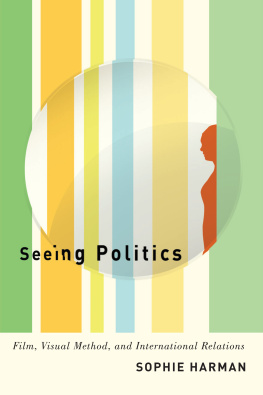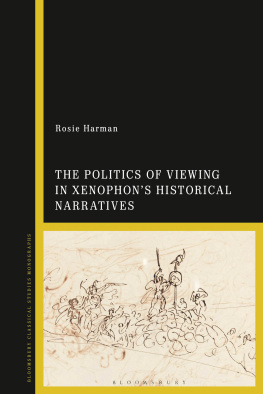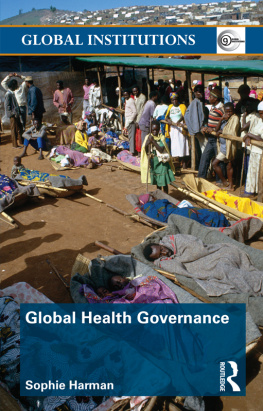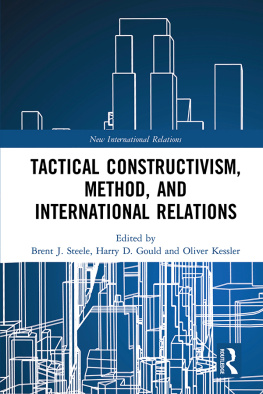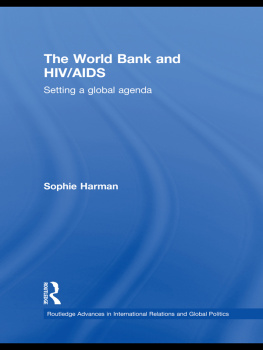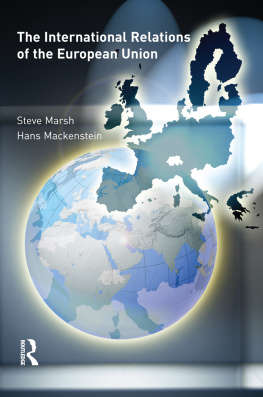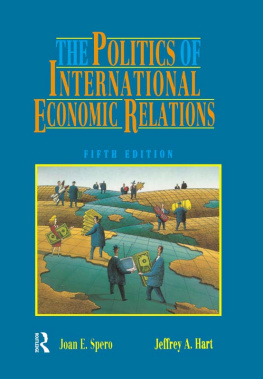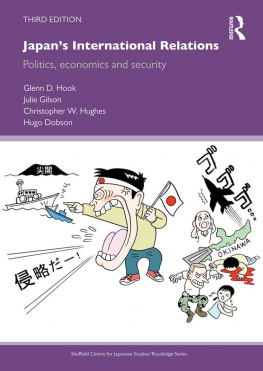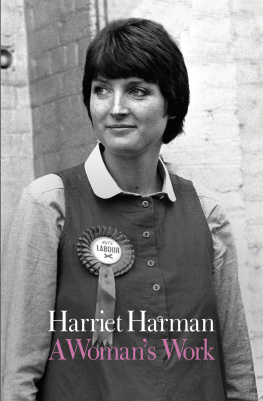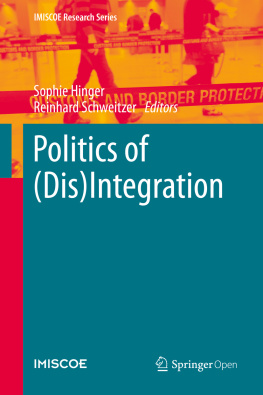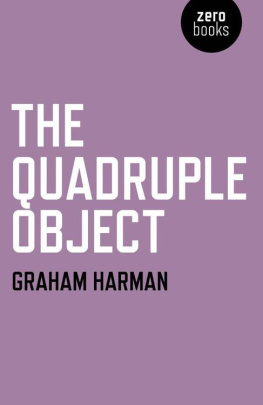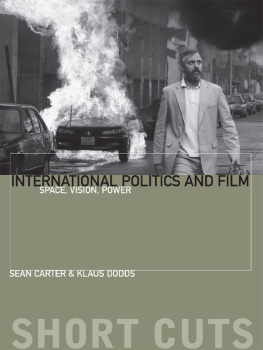Harman Sophie - Seeing Politics: Film, Visual Method, and International Relations
Here you can read online Harman Sophie - Seeing Politics: Film, Visual Method, and International Relations full text of the book (entire story) in english for free. Download pdf and epub, get meaning, cover and reviews about this ebook. year: 2019, publisher: McGill-Queens University Press, genre: Politics. Description of the work, (preface) as well as reviews are available. Best literature library LitArk.com created for fans of good reading and offers a wide selection of genres:
Romance novel
Science fiction
Adventure
Detective
Science
History
Home and family
Prose
Art
Politics
Computer
Non-fiction
Religion
Business
Children
Humor
Choose a favorite category and find really read worthwhile books. Enjoy immersion in the world of imagination, feel the emotions of the characters or learn something new for yourself, make an fascinating discovery.
- Book:Seeing Politics: Film, Visual Method, and International Relations
- Author:
- Publisher:McGill-Queens University Press
- Genre:
- Year:2019
- Rating:3 / 5
- Favourites:Add to favourites
- Your mark:
- 60
- 1
- 2
- 3
- 4
- 5
Seeing Politics: Film, Visual Method, and International Relations: summary, description and annotation
We offer to read an annotation, description, summary or preface (depends on what the author of the book "Seeing Politics: Film, Visual Method, and International Relations" wrote himself). If you haven't found the necessary information about the book — write in the comments, we will try to find it.
Harman Sophie: author's other books
Who wrote Seeing Politics: Film, Visual Method, and International Relations? Find out the surname, the name of the author of the book and a list of all author's works by series.
Seeing Politics: Film, Visual Method, and International Relations — read online for free the complete book (whole text) full work
Below is the text of the book, divided by pages. System saving the place of the last page read, allows you to conveniently read the book "Seeing Politics: Film, Visual Method, and International Relations" online for free, without having to search again every time where you left off. Put a bookmark, and you can go to the page where you finished reading at any time.
Font size:
Interval:
Bookmark:

Seeing Politics
Seeing Politics
Film, Visual Method, and International Relations
SOPHIE HARMAN
McGill-Queens University Press
Montreal & Kingston London Chicago
McGill-Queens University Press 2019
ISBN 978-0-7735-5730-7 (cloth)
ISBN 978-0-7735-5731-4 (paper)
ISBN 978-0-7735-5787-1 (ePDF)
ISBN 978-0-7735-5788-8 (ePUB)
Legal deposit second quarter 2019
Bibliothque nationale du Qubec
Printed in Canada on acid-free paper that is 100% ancient forest free
(100% post-consumer recycled), processed chlorine free

We acknowledge the support of the Canada Council for the Arts.
Nous remercions le Conseil des arts du Canada de son soutien.
Library and Archives Canada Cataloguing in Publication
Title: Seeing politics : film, visual method, and international relations / Sophie Harman.
Names: Harman, Sophie, author.
Description: Includes bibliographical references and index.
Identifiers: Canadiana (print) 20190074302 | Canadiana (ebook) 20190074345 | ISBN 9780773557314 (softcover) | ISBN 9780773557307 (hardcover) | ISBN 9780773557871 (ePDF) | ISBN 9780773557888 (ePUB)
Subjects: LCSH: Politics in motion pictures. | LCSH: International relations. | LCSH: World politicsResearch.
Classification: LCC PN1995.9.P6 H37 2019 | DDC 791.43/6581dc23
This book was typeset in 10.5/13 Sabon.
Contents
Tables and Figures
TABLES
FIGURES
Preface
Seeing Politics is about pushing the disciplinary boundaries of how we do research, how we communicate research, and what counts as scholarship in world politics. It is about how we see and do International Relations (IR) differently. The book was initially for people who wanted to make a film about politics and IR and to give them a sense of what it would involve from pre-production to production to post-production and consumption. It was for those who wanted to make the leap from reading visual politics to writing visual politics, to give them insight and demystify the whole process. However, I could not write this book without a direct account of my own role and position within the research process, particularly with reference to the ways in which I have navigated both the co-production with various project partners and the gatekeeping aspect to how stories are told and seen. I therefore wanted to write a book that would confront the uncomfortable aspect of co-produced research and show the politics of conducting fieldwork in a country that is not ones own. This is a politics that is discussed in informal settings but erased in any formal discussion on research methods or practices. This is a politics that is fundamental to understanding both transnational feminist practice and Africa and international relations. In my process of writing and discussing the book with colleagues, Seeing Politics came to be about something more than film as a compelling method in which to see hidden politics; it is about bigger questions of knowledge how we produce it, how we consume it, and what counts as academic scholarship.
Up until 2015, I was an academic who knew nothing about film. My background is not in film production, visual politics, or visual ethnography; it is in IR, with a specific focus on global health politics. Given this lack of knowledge and expertise, why and how did I end up making a film and then writing a book about it?
I made a film out of frustration with both global health and IR. My frustration arose from an absence of seeing how global health policies affected peoples lives in complex ways; how politics played a role within this; and how, for a field that is interested in the improvement of peoples well-being, it does not see or ask them about their needs. Global health policies and initiatives tend to reduce people to numbers in data sets. We see tokenistic storytelling of need (to secure international funds), success stories (to maintain international funds), or carefully organized field visits for national and global policy experts. That is if people are considered at all. A great amount of work in global health governance and politics is interested in scientific innovation as a solution to complex health problems, institutions, and policy-makers. The majority of research takes place in the global health hubs of Washington and Geneva where policies are made, not in the small towns and villages where the policies are implemented. The only exception seems to be in public health anthropology. This means that global health governance misses the basic needs of populations, and lacks nuance as to how policies become translated in practice and, crucially, how political structures such as gender can bar peoples access to health care and healthy lives. Global health has a substantial gender problem: it does not see women or gender.
Such frustrations are particularly acute in the global HIV/AIDS response. The majority of people living with HIV are women, yet their experiences and agency are instrumentalized (for care roles, advocacy, or positive-donor narratives), and the free labour they provide is assumed as given. These women are framed as security threats, passive recipients of HIV treatment, or risky numbers. Their everyday lives of managing their status, accessing treatment, raising children, maintaining employment, and navigating gender inequality goes unseen in global health policy.
My second frustration stemmed from the way in which women are seen in IR. Women living with HIV/AIDS or carrying the burden of under-resourced and weak health systems are rarely seen as relevant to the study of IR. They are only relevant when framed as a threat to international security. While interest in global health has grown within IR, such interest is framed within the usual references to state interests, institutions, norms, orders, and security. The exceptions here are feminist research that seeks to reveal the unseen or hidden ways international relations affects everyday life, and how everyday life underpins international relations; and decolonial research that seeks to confront the epistemological basis of knowing in IR. Feminists, and particularly decolonial feminists, have known and shown for decades how women, particularly women living in sub-Saharan Africa, are ignored or unseen in IR. Nevertheless, the problem persists.
After years of writing and talking about the need to see women in global health and IR and of growing frustration at the lack of progress, I decided to change my methods of getting women and gender seen. To get people to see for themselves and to allow women living with HIV/AIDS to express themselves require different, bolder, and new methods of seeing. I needed a visual method that would appeal to global audiences and get them thinking and feeling about the subject. I decided to make a film.
While I did not have previous experience in filmmaking, I did have experience working in sub-Saharan Africa. I have conducted fieldwork in Kenya, Sierra Leone, Tanzania, Uganda, and Zambia, and in 2006 I established a non-governmental organization (NGO) in Tanzania that provides free transportation for people living with HIV/AIDS in rural communities to care and treatment clinics. My existing research in Africa and my networks in Tanzania gave me access to communities affected by HIV/AIDS (to community health workers, peer educators, local politicians, doctors, and women living with HIV/AIDS) to make a film set in a real town with real people. The film,
Next pageFont size:
Interval:
Bookmark:
Similar books «Seeing Politics: Film, Visual Method, and International Relations»
Look at similar books to Seeing Politics: Film, Visual Method, and International Relations. We have selected literature similar in name and meaning in the hope of providing readers with more options to find new, interesting, not yet read works.
Discussion, reviews of the book Seeing Politics: Film, Visual Method, and International Relations and just readers' own opinions. Leave your comments, write what you think about the work, its meaning or the main characters. Specify what exactly you liked and what you didn't like, and why you think so.

